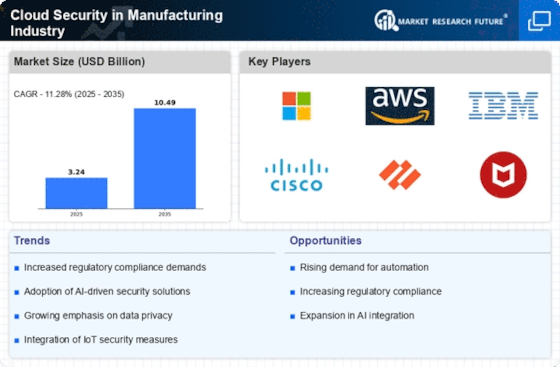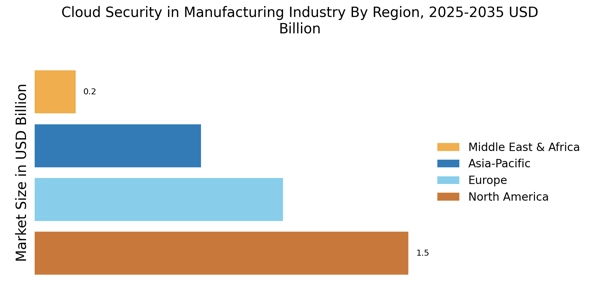Rising Cybersecurity Threats
The manufacturing industry is increasingly targeted by cybercriminals, leading to a heightened focus on Cloud Security in the Manufacturing Sector. In recent years, the number of cyberattacks on manufacturing firms has surged, with reports indicating a 30% increase in incidents. This trend compels manufacturers to invest in robust cloud security solutions to safeguard sensitive data and intellectual property. As the industry becomes more interconnected through IoT devices and smart manufacturing technologies, the attack surface expands, making it imperative for organizations to adopt comprehensive cloud security measures. The potential financial losses from data breaches and operational disruptions further underscore the necessity for enhanced security protocols, driving demand for cloud security solutions tailored to the unique challenges faced by the manufacturing sector.
Regulatory Compliance Requirements
Compliance with industry regulations is a critical driver for Cloud Security in the Manufacturing Sector. Manufacturers are subject to various regulations, such as the General Data Protection Regulation (GDPR) and the Health Insurance Portability and Accountability Act (HIPAA), which mandate stringent data protection measures. Non-compliance can result in hefty fines and reputational damage, prompting manufacturers to prioritize cloud security solutions that ensure adherence to these regulations. The increasing complexity of compliance requirements necessitates the implementation of advanced security frameworks that can effectively manage data privacy and security risks. As regulatory bodies continue to evolve their standards, manufacturers must remain vigilant and proactive in their approach to cloud security, thereby fostering a culture of compliance and risk management.
Integration of IoT and Smart Manufacturing
The integration of IoT devices and smart manufacturing technologies is transforming the landscape of Cloud Security in the Manufacturing Sector. As manufacturers adopt connected devices to enhance operational efficiency, the volume of data generated increases exponentially. This proliferation of data necessitates robust cloud security measures to protect against unauthorized access and data breaches. According to industry estimates, the number of connected devices in manufacturing is expected to reach 75 billion by 2025, amplifying the need for effective security solutions. Manufacturers must ensure that their cloud security strategies are capable of addressing the unique vulnerabilities associated with IoT ecosystems. This trend not only drives investment in cloud security but also encourages collaboration among technology providers to develop innovative solutions that enhance the overall security posture of the manufacturing sector.
Shift Towards Remote Work and Collaboration
The shift towards remote work and collaboration in the manufacturing industry has significant implications for Cloud Security in the Manufacturing Sector. As more employees work remotely, the reliance on cloud-based tools and platforms increases, creating new security challenges. Manufacturers must ensure that their cloud security measures are robust enough to protect sensitive information accessed from various locations and devices. This trend has led to a surge in demand for secure access solutions, such as virtual private networks (VPNs) and multi-factor authentication (MFA). Furthermore, the need for secure collaboration tools has prompted manufacturers to invest in cloud security solutions that facilitate safe information sharing among teams. As remote work becomes a permanent fixture in the industry, the emphasis on cloud security will likely continue to grow, shaping the future of manufacturing operations.
Increased Investment in Digital Transformation
The ongoing digital transformation within the manufacturing sector is a key driver for Cloud Security in the Manufacturing Sector. As manufacturers increasingly adopt digital technologies to enhance productivity and efficiency, the need for secure cloud environments becomes paramount. Investment in digital transformation initiatives is projected to reach $1.5 trillion by 2025, highlighting the urgency for manufacturers to prioritize cloud security. This transformation often involves migrating critical applications and data to the cloud, which necessitates comprehensive security strategies to mitigate risks. Manufacturers must navigate the complexities of securing cloud infrastructures while ensuring seamless integration with existing systems. The focus on digital transformation not only drives demand for cloud security solutions but also encourages manufacturers to adopt a proactive approach to risk management, ultimately fostering a more resilient operational framework.

















